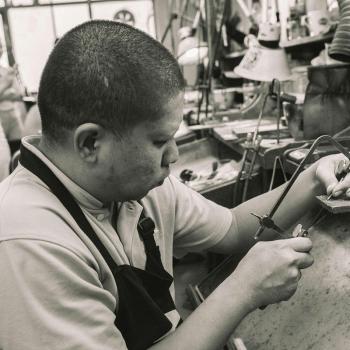Viewing God as our heavenly father is problematic for people who always felt their dads were disappointed in them.

Daddy Issues
“Are you stupid?” I yelled at my son. Instantly, I heard my own dad’s voice in my words. That’s what he’d said to me when I was the same age as my kid. Without missing a beat, I answered my own question. “Of course, you’re not stupid—you’re way too smart for the stupid thing you’re doing!” But the damage had been done. He was way too smart to believe I hadn’t started out with an insult and then tried to cover it up once I realized what I’d done. The thing is, I didn’t mean it. I was reacting out of my own childhood trauma, passing my woundedness on to my own child. But that didn’t matter to him. All he knew was my disapproval. Just like the disapproval I received from my dad.
Even though I tried to be the best father I could, I’m sure that all my kids have their daddy issues. Just like I have issues from my own dad’s disapproving words, tone of voice, and body language. Just like he has issues from the man he called “Father.” Hopefully, my kids will be better parents than I am. And I hope I’m a better dad than my father. And I know that, despite his flaws, my dad is a hell of a lot better parent than his father. Even so, hopefully each generation improves on the one before it. But still, we often repeat the mistakes of our parents. Even good dads wound their own children. This daddy-damage makes it difficult for Christians who learned to think of God as their heavenly father.
Disapproving Dad
Disapproving Dad is one of the predominant themes in the Bible. The first sin brings divine disappointment that can only be satisfied by sacrifice. Religion itself may stem from a human attempt to please parents and grandparents. We transfer our daddy issues onto a disappointed sky-father and go to extreme lengths to try to measure up. To hold the flashlight in the right spot. To return the borrowed car with a full gas tank. If we just follow the rules, Daddy will be proud of us. But if we screw up, Father will scowl and frown. Or even throw us into hell.
Punishing Patriarch
I refuse to believe the narrative that describes God as a Punishing Patriarch who sends earth’s children to hell, either for sins they commit or simply for not believing. An earthly father who punishes his child by holding their hand to a candle flame would be charged with child abuse. But somehow, we’ve come to believe a loving God would burn human souls for eternity. This is completely incompatible with Jesus’ notion of love. He said, “If you earthly fathers know how to give good things to your children, even though you are sinful, how much more will God give good things to those who ask…(Matthew 7:11)?” By the same token, whatever an abusive father might do could never be possible for God.
God is Well-Pleased
This is why it was such a revelation for the skies to open on Jesus’ baptism, with the divine voice declaring, “This is my beloved Son, in whom I am well pleased.” Jesus was even more radical when he taught us to pray to “Our Father in heaven.” Jesus invited us to relate to God the same way that he related to God—as a dear parent who cherishes all earth’s children. Those who find their relationship with God through the Way of Jesus know that God is not a disapproving father, but a pleased parent.
In this way of relating to God, we know that our value stems not from how many sacrifices we can make, or how many rules we follow. Our worth is not something we earn, like a child trying to get a parent to approve. We need never fear that God will turn away from us, as if God cannot look on sin. Instead, we can boldly approach God, knowing that we are God’s beloved—completely welcome to climb up into the lap of Love. The next time you feel like your sin has separated you from God, or that you are unworthy of God’s love, remember that the skies open for you as well. God brags about you from the heavens, declaring that you are the divine beloved, in whom God is well-pleased.












